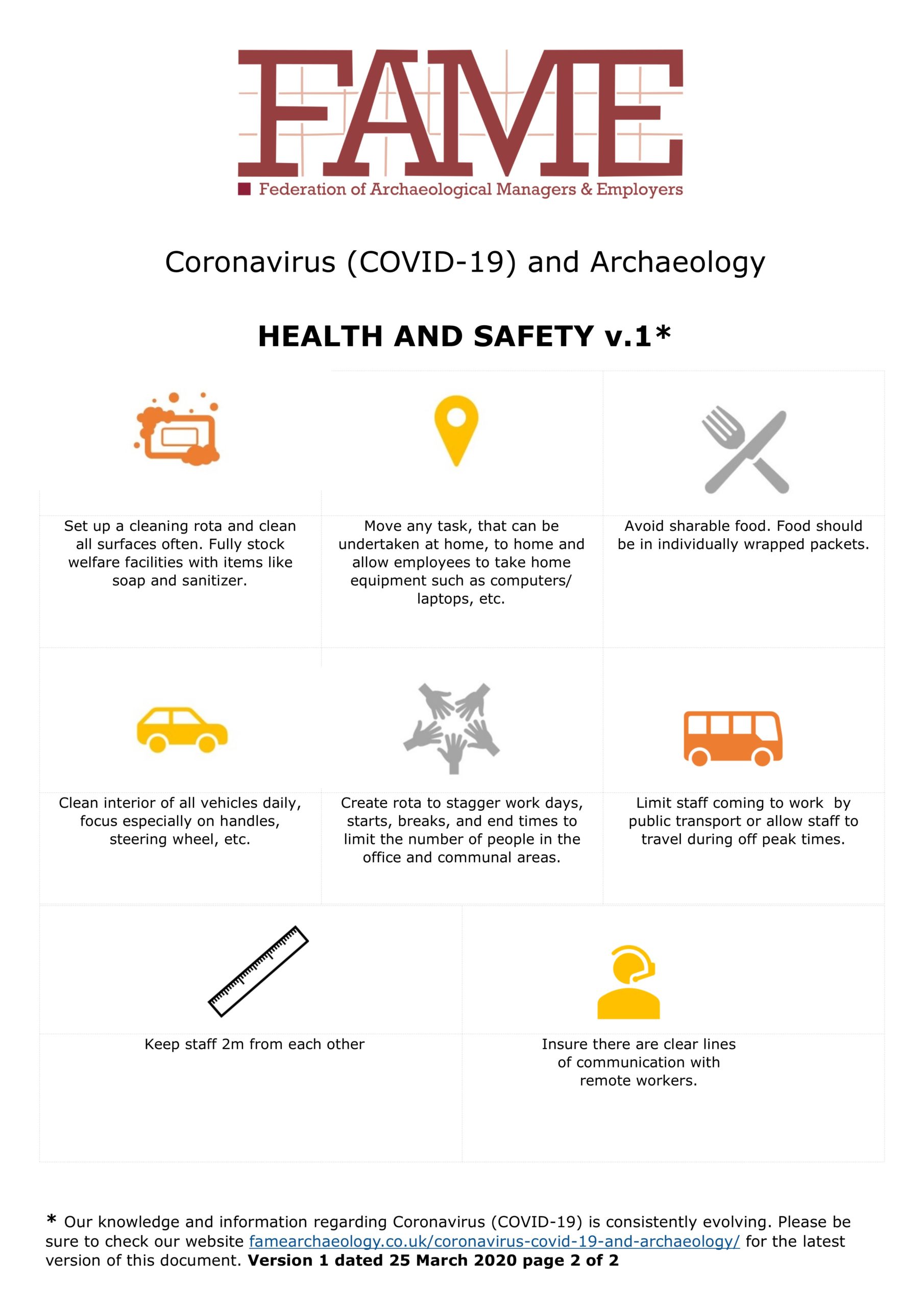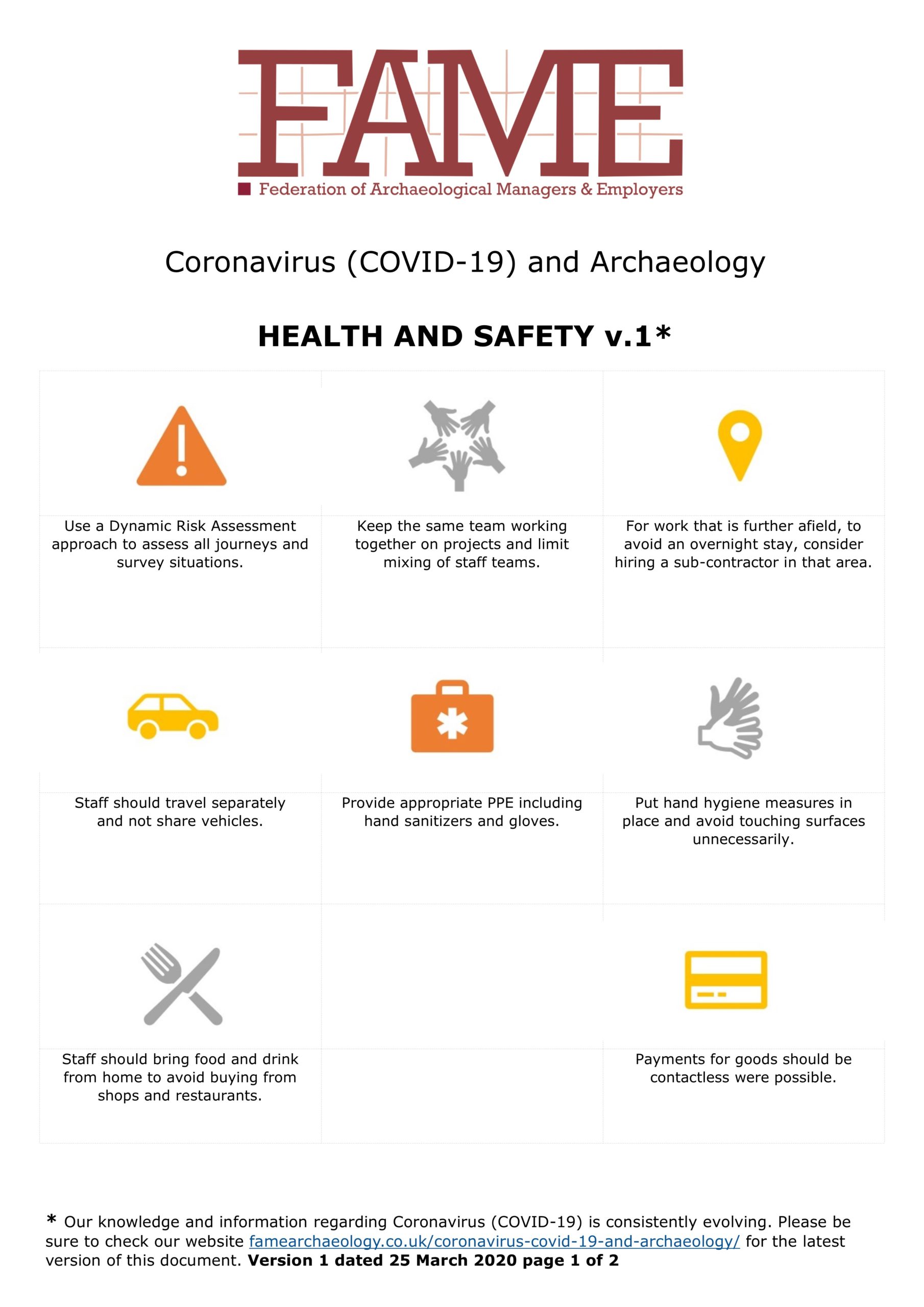Government support update, FAME member experiences and H&S
Message from the CEO to members:
Dear FAME members,
We have some updates for you on the various support schemes as well as some issues members are facing, first the support information adapted from Heritage Alliance for you:
Coronavirus Job Retention Scheme
The Government has released guidance on its Coronavirus Job Retention Scheme. Further details can be found here.
Key points:
- The scheme is open to all employers (businesses, charities, recruitment agencies, and public authorities).
- Employers can use an online service to claim for 80% of furloughed employees’ usual monthly wage costs, up to £2,500 a month, plus the associated Employer National Insurance contributions and minimum automatic enrollment employer pension contributions on that wage. Employers can use this scheme anytime during this period.
- You must have created and started a PAYE payroll scheme on or before 28 February 2020 and have a UK bank account. Furloughed employees must have been on the payroll on 28 February 2020, and can be on any type of contract, including: full-time employees, part-time employees, employees on agency contracts, and employees on flexible or zero-hour contracts.
- The scheme also covers employees who were made redundant since 28 February 2020, if they are rehired by their employer.
- To be eligible for the subsidy, when on furlough, an employee can not undertake work for or on behalf of the organisation. This includes providing services or generating revenue. While on furlough, the employee’s wage will be subject to usual income tax and other deductions.
- If an employee is working, but on reduced hours, or for reduced pay, they will not be eligible for this scheme and you will have to continue paying the employee through your payroll and pay their salary subject to the terms of the employment contract you agreed.
- Not all employees in an organisation need to be furloughed.
- The 80% calculation is based on the employee’s pre-tax salary. Employees must be paid either 80% of their salary, or £2,500 (whichever is lower), even if this means they end up receiving a wage below the National Living Wage.
- Employers can only submit one claim at least every 3 weeks, which is the minimum length an employee can be furloughed for. Claims can be backdated until the 1 March if applicable.
Self-employment Income Support Scheme
- The Self-employment Income Support Scheme (SEISS) will support self-employed individuals (including members of partnerships) whose income has been negatively impacted by Coronavirus. The scheme will provide a grant to self-employed individuals or partnerships, worth 80% of their profits up to a cap of £2,500 per month.
- HMRC will use the average profits from tax returns in 2016-17, 2017-18 and 2018-19 to calculate the size of the grant. The scheme will be open to those where the majority of their income comes from self-employment and who have profits of less than £50,000. The scheme will be open for an initial three months with people able to make their first claim by the beginning of June.
To be eligible for the scheme you must meet all the criteria below:
- Be self-employed or a member of partnership;
- Have lost trading/partnership trading profits due to COVID-19;
- File a tax return for 2018-19 as self-employed or a member of a trading partnership. Those who have not yet filed for 2018-19 will have an additional 4 weeks from this announcement to do so;
- Have traded in 2019-20; be currently trading at the point of application (or would be except for COVID 19) and intend to continue to trade in the tax year 2020 to 2021
- Have trading profits of less than £50,000 and more than half of your total income come from self-employment. This can be with reference to at least one of the following conditions:
-
- Your trading profits and total income in 2018/19
- Your average trading profits and total income across up to the three years between 2016-17, 2017-18, and 2018-19.
- Individuals should not contact HMRC now. HMRC will use existing information to check potential eligibility and invite applications once the scheme is operational. Grants are expected to start to be paid out by beginning of June 2020.
- HMRC are publishing guidance on the scheme, which is available here. This guidance will continue to be updated.
- NOTE – for those who work for themselves but have set themselves up as a Limited Company. Directors are able to furlough themselves, but can only claim for PAYE income. As many directors claim only part of their income as PAYE and the rest as dividends, only the PAYE payments will qualify for the Job Retention Scheme. There is no support for loss of dividend income.
I have heard from a member that has acted very appropriately when they were put in a very difficult situation by a client that was seeking to use the crisis to undermine their contractual agreements. I hope this is an inspiration to all FAME members.
“Thought I should feedback our 1st example of a client trying to take advantage of the current situation. We had a client just now try to bleat that because of the market, a few land deals have had to slow down and so would we consider reducing an invoice (which was only £3K, including VAT, in the 1st place) that we raised at the end of Feb for work undertaken in late Jan/early Feb and that if we were to do so, they would process payment quickly – an implied but clear threat there if we don’t. We have told them to get stuffed (in a firm but pleasant way) and if they decide not to use us in future because of this, then so be it as I don’t want [THIS COMPANY] to work with people who are prepared to be so unscrupulous. I think we as a profession need to be very firm about such things as otherwise we devalue what we as a profession do, as well as opening the flood gates of the development industry seeing archaeology as a push over, and also ultimately reducing risk of unnecessary furloughing and redundancies. Like the rest of the profession, we are making our plans for furloughing which we anticipate will need to be put into place in the coming weeks, definitely not months, and if we were to agree to such threats, the inevitability of this becomes greater.”
Best wishes,
Kenneth FAME CEO


